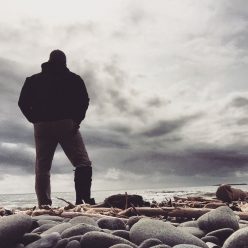As a participant in the Student Originated Study: Commodification and its Alternatives, I pursued a project on the commodification of salmon, with an internship component. The total credits attempted are 12 and I will be breaking the credits into thirds, so 4 credits for the class component, 4 credits for the internship, and 4 credits for the project.
The first 4 credits I pursued included participation in a weekly class, weekly readings, tasting labs, and seminar discussion papers. I completed all seminar papers. Some of my favorite papers included week 2: talking about eating and sexuality, week 3: Tompkins discussed 19th century eating culture and the movement against over indulgence, and week 6: Winona LaDuke’s accounts of working to save salmon and water from pollution. I also prepared a meal for the class on week 4, Sean and I prepared a vegan dish of winter vegetable soup and a wild rice pilaf.
The second 4 credit section is my internship component. I interned with Nisqually River Education Project during their Salmon Toss activity, Water Quality Monitoring, and Student GREEN Congress. As an intern I learned valuable real life experience in a professional setting. I gave presentations to student grades 3rd-12th. In these presentations we talked about the importance of salmon in the ecosystem, the salmon, life-cycle, and why toss salmon. On top of presentations, I would also have regular communications with teachers, volunteers, and other Non-profits. Other projects include: logo contest (designing poster and handling entries), writing press releases, data collection for Water Quality, making graphs of data, and making an Action Video for Climate Change activities. Here is an example from the Internship blog post section: “The decaying salmon bodies will support the trees, young salmon, raccoons, the river, the birds, and other wildlife. This is what we teach the children; we teach them to preserve, restore, and respect the mighty Salmon. We are teaching them the price to pay for the ease of commodification, and the price is high” (Fields Week 2).
The last 4 credits, which complete my 12 credits, is the project component. For this I read the book The Tragedy of the Commodity: oceans, fisheries, and aquaculture by Longo, Clausen, and Clark, and explored salmon commodification. In my WordPress I created a web page specifically for this topic. Here are some of example of the writings: “When it comes to reform in fish management, we have to reform the social barriers, and the economic barriers. We need to bring communities back together and untie our hands from the shackles of the state run social systems. The biggest solution (that I see) is stopping worker exploration in the food system (and most industries), give those workers the production management, allow workers to decided how surplus is distributed, and stop using our natural world for the base of all commodities. The political barriers to these changes are possible. The impossibility is the recovery of our earth from the point of no return. No earth=no humanity” (Fields week 9), “ITQ’s further the ecological instability of fish species, by reducing them to a single transaction that can be cashed in at any time. It does not take into consideration that fish populations are better fished at certain periods of the year, or that there need to closed seasons for rest and re-population. ITQ’s also favor some fishers over others and does not create an equitable system” (Fields Week 5), and “Salmon are in a fast decline. The Chinook and Steelhead Salmon of the Nisqually River Stocks are already considered a Threatened Species, with only around 600 Wild Chinook salmon returning every year. My goal with this post and with this project moving forward is looking into the past and present systems of fisheries management. As you can see we have entered the Rabbit Hole, our next step is down” (Fields Week 3). Though these blog post and my interview with a harvest biologist, I learned the truth of how fisheries are managed and what needs to change. The number change is the change to our economic system, moving away from Capitalism and away from exploitation.
